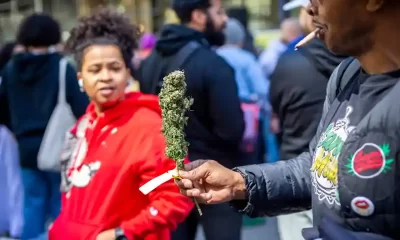Government
Colorado Springs Recreational Cannabis Initiative Qualifies for November Ballot

Activists in Colorado Springs have successfully placed two measures to legalize and tax adult-use cannabis sales on the November ballot.
Activists intent on legalizing recreational pot sales in Colorado Springs, Colorado cleared a significant hurdle this week with the announcement that two related adult-use cannabis sales voter initiatives have qualified for the November ballot.
The first ballot measure advanced by the group Your Choice Colorado Springs would legalize recreational weed sales in Colorado Springs, while the second would impose a 5% tax on purchases of adult-use cannabis. If passed by the voters, tax revenue from recreational sales would fund public safety improvements, expand mental health services, and support PTSD programs for veterans.
“Voters in the city stepped up and demanded their voice be heard with respect to ending the prohibition of recreational cannabis sales in Colorado Springs,” Your Choice campaign manager Anthony Carlson said on Monday after announcing the measures had qualified for the ballot. “Especially in these tough economic times, it is critical to ensure every tax dollar that rightfully belongs to Colorado Springs taxpayers stays in our community working to improve our quality of life.”
Colorado voters legalized sales of recreational cannabis with the passage of Amendment 64 in 2012, and regulated sales began in the state two years later. However, the Colorado Springs local government banned recreational cannabis sales in 2013, although the city is home to more than 100 medical dispensaries.
Your Choice Colorado Springs announced its plan for the ballot measure to legalize recreational cannabis sales in January and began circulating petitions to qualify the measures for the ballot in March. Activists had until June 20 to collect 19,245 signatures from Colorado Springs residents. The group far exceeded the requirement, turning in more than 98,000 signatures last month.
Pot Taxes Go to Other Cities
Your Choice Colorado Springs maintains that city residents who purchase adult-use cannabis legally must travel to other communities, which reap the tax benefits of recreational cannabis sales. If the initiatives succeed in this November’s election, a portion of the tax proceeds will help fund mental health services and support PTSD programs for military veterans. Colorado Springs has one of the highest veteran populations in the country, with 17% of adult residents identifying as veterans compared to the national average of 7.1%, according to a recent report from The Center Square.
“Our region led the state in suicides last year,” Carlson said, noting that 30% of those who took their own lives were veterans. “This initiative will provide significant funding to ensure we finally have the resources to take control of this crisis.”
Under the legalization initiative, no additional cannabis retail stores would be permitted in the city, but existing medical cannabis retailers would be able to add recreational cannabis on the same premise as their medical location. Karlie Van Arnam, a small business owner and lead elector sponsoring the initiatives, said the campaign “is about practicality.”
“It makes zero sense to continue the prohibition of a product that is 100% legal to possess and consume in our city,” said Arnam. “This campaign isn’t just about revenue. It’s about personal freedom and choice for our residents. It’s about supporting our small businesses and the thousands of people they employ. It’s about expanding mental health access for citizens and ensuring our veterans have access to world-class PTSD programs right here in Colorado Springs. It’s about time this decision is taken out of the hands of a few politicians and given to the people.”
Colorado Springs Mayor Opposes Legalization
Colorado Springs Mayor John Suthers, who has opposed approving recreational cannabis sales in the city for years, issued a statement warning voters about potentially negative aspects of legalizing.
“I remain vehemently opposed to legalizing recreational marijuana in Colorado Springs. There are no regulations in Colorado limiting THC levels which continue to rise and adversely impact young marijuana users,” said Suthers. “In cities with recreational marijuana, it’s not paying for the full cost of the damage it’s doing. Denver, in particular, offers a cautionary tale. In three years, it has dropped from No. 2 to No. 55 in the U.S. News & World Report rankings for best city to live. The pervasive influence of marijuana is a significant factor.”
Carlson said that despite the opposition from city leaders, voters are likely to approve the ballot measure in this November’s general election.
“Colorado Springs residents overwhelmingly voted to approve Amendment 64 in 2012. Our City Council and Mayor have repeatedly defied the will of Colorado Springs voters by keeping recreational cannabis—and its tax revenues—out of Colorado Springs for the past decade, at a loss of $150 million,” Carlson said in an email to High Times. “Now our citizens have spoken again, submitting a record 98,000 signatures—more than 2.5 times more than required—to get these measures on the ballot. The will of Colorado Springs citizens is crystal clear: They want to keep tax revenues from recreational cannabis in Colorado Springs to support efforts including mental health and veteran services.”
Business
New Mexico cannabis operator fined, loses license for alleged BioTrack fraud

New Mexico regulators fined a cannabis operator nearly $300,000 and revoked its license after the company allegedly created fake reports in the state’s traceability software.
The New Mexico Cannabis Control Division (CCD) accused marijuana manufacturer and retailer Golden Roots of 11 violations, according to Albuquerque Business First.
Golden Roots operates the The Cannabis Revolution Dispensary.
The majority of the violations are related to the Albuquerque company’s improper use of BioTrack, which has been New Mexico’s track-and-trace vendor since 2015.
The CCD alleges Golden Roots reported marijuana production only two months after it had received its vertically integrated license, according to Albuquerque Business First.
Because cannabis takes longer than two months to be cultivated, the CCD was suspicious of the report.
After inspecting the company’s premises, the CCD alleged Golden Roots reported cultivation, transportation and sales in BioTrack but wasn’t able to provide officers who inspected the site evidence that the operator was cultivating cannabis.
In April, the CCD revoked Golden Roots’ license and issued a $10,000 fine, according to the news outlet.
The company requested a hearing, which the regulator scheduled for Sept. 1.
At the hearing, the CCD testified that the company’s dried-cannabis weights in BioTrack were suspicious because they didn’t seem to accurately reflect how much weight marijuana loses as it dries.
Company employees also poorly accounted for why they were making adjustments in the system of up to 24 pounds of cannabis, making comments such as “bad” or “mistake” in the software, Albuquerque Business First reported.
Golden Roots was fined $298,972.05 – the amount regulators allege the company made selling products that weren’t properly accounted for in BioTrack.
The CCD has been cracking down on cannabis operators accused of selling products procured from out-of-state or not grown legally:
- Regulators alleged in August that Albuquerque dispensary Sawmill Sweet Leaf sold out-of-state products and didn’t have a license for extraction.
- Paradise Exotics Distro lost its license in July after regulators alleged the company sold products made in California.
Golden Roots was the first alleged rulebreaker in New Mexico to be asked to pay a large fine.
Source: https://mjbizdaily.com/new-mexico-cannabis-operator-fined-loses-license-for-alleged-biotrack-fraud/
Business
Marijuana companies suing US attorney general in federal prohibition challenge

Four marijuana companies, including a multistate operator, have filed a lawsuit against U.S. Attorney General Merrick Garland in which they allege the federal MJ prohibition under the Controlled Substances Act is no longer constitutional.
According to the complaint, filed Thursday in U.S. District Court in Massachusetts, retailer Canna Provisions, Treevit delivery service CEO Gyasi Sellers, cultivator Wiseacre Farm and MSO Verano Holdings Corp. are all harmed by “the federal government’s unconstitutional ban on cultivating, manufacturing, distributing, or possessing intrastate marijuana.”
Verano is headquartered in Chicago but has operations in Massachusetts; the other three operators are based in Massachusetts.
The lawsuit seeks a ruling that the “Controlled Substances Act is unconstitutional as applied to the intrastate cultivation, manufacture, possession, and distribution of marijuana pursuant to state law.”
The companies want the case to go before the U.S. Supreme Court.
They hired prominent law firm Boies Schiller Flexner to represent them.
The New York-based firm’s principal is David Boies, whose former clients include Microsoft, former presidential candidate Al Gore and Elizabeth Holmes’ disgraced startup Theranos.
Similar challenges to the federal Controlled Substances Act (CSA) have failed.
One such challenge led to a landmark Supreme Court decision in 2005.
In Gonzalez vs. Raich, the highest court in the United States ruled in a 6-3 decision that the commerce clause of the U.S. Constitution gave Congress the power to outlaw marijuana federally, even though state laws allow the cultivation and sale of cannabis.
In the 18 years since that ruling, 23 states and the District of Columbia have legalized adult-use marijuana and the federal government has allowed a multibillion-dollar cannabis industry to thrive.
Since both Congress and the U.S. Department of Justice, currently headed by Garland, have declined to intervene in state-licensed marijuana markets, the key facts that led to the Supreme Court’s 2005 ruling “no longer apply,” Boies said in a statement Thursday.
“The Supreme Court has since made clear that the federal government lacks the authority to regulate purely intrastate commerce,” Boies said.
“Moreover, the facts on which those precedents are based are no longer true.”
Verano President Darren Weiss said in a statement the company is “prepared to bring this case all the way to the Supreme Court in order to align federal law with how Congress has acted for years.”
While the Biden administration’s push to reschedule marijuana would help solve marijuana operators’ federal tax woes, neither rescheduling nor modest Congressional reforms such as the SAFER Banking Act “solve the fundamental issue,” Weiss added.
“The application of the CSA to lawful state-run cannabis business is an unconstitutional overreach on state sovereignty that has led to decades of harm, failed businesses, lost jobs, and unsafe working conditions.”
Business
Alabama to make another attempt Dec. 1 to award medical cannabis licenses

Alabama regulators are targeting Dec. 1 to award the first batch of medical cannabis business licenses after the agency’s first two attempts were scrapped because of scoring errors and litigation.
The first licenses will be awarded to individual cultivators, delivery providers, processors, dispensaries and state testing labs, according to the Alabama Medical Cannabis Commission (AMCC).
Then, on Dec. 12, the AMCC will award licenses for vertically integrated operations, a designation set primarily for multistate operators.
Licenses are expected to be handed out 28 days after they have been awarded, so MMJ production could begin in early January, according to the Alabama Daily News.
That means MMJ products could be available for patients around early March, an AMCC spokesperson told the media outlet.
Regulators initially awarded 21 business licenses in June, only to void them after applicants alleged inconsistencies with how the applications were scored.
Then, in August, the state awarded 24 different licenses – 19 went to June recipients – only to reverse themselves again and scratch those licenses after spurned applicants filed lawsuits.
A state judge dismissed a lawsuit filed by Chicago-based MSO Verano Holdings Corp., but another lawsuit is pending.
Source: https://mjbizdaily.com/alabama-plans-to-award-medical-cannabis-licenses-dec-1/
-

 Business2 years ago
Business2 years agoPot Odor Does Not Justify Probable Cause for Vehicle Searches, Minnesota Court Affirms
-

 Business2 years ago
Business2 years agoNew Mexico cannabis operator fined, loses license for alleged BioTrack fraud
-

 Business2 years ago
Business2 years agoAlabama to make another attempt Dec. 1 to award medical cannabis licenses
-

 Business2 years ago
Business2 years agoWashington State Pays Out $9.4 Million in Refunds Relating to Drug Convictions
-

 Business2 years ago
Business2 years agoMarijuana companies suing US attorney general in federal prohibition challenge
-

 Business2 years ago
Business2 years agoLegal Marijuana Handed A Nothing Burger From NY State
-

 Business2 years ago
Business2 years agoCan Cannabis Help Seasonal Depression
-

 Blogs2 years ago
Blogs2 years agoCannabis Art Is Flourishing On Etsy













